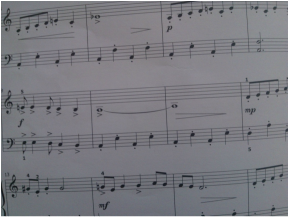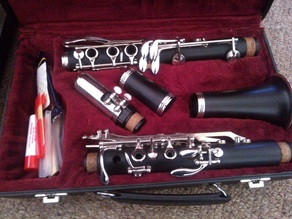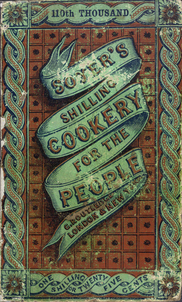 You might have heard of a Grade-One-athon before, or maybe not! Normally it involves an - often sponsored for charity - attempt to pick up an instrument you've never played before, enter and pass a Grade One exam within a term. I've known quite a few music teachers and other people who already play an instrument give it a go - sometimes it's been a quick challenge, and sometimes it's led to a love of an additional instrument that they've kept on playing long past Grade One. I'm not exactly doing that, as my challenges don't involve instruments that are 'brand new' to me. But this term I'm sitting two Grade Ones, and here's why... Piano - I don't remember exactly when and how I learned which notes were which on the piano. As a child interested in music I picked it up here and there I think, learned a bit from friends who had lessons. I had a keyboard from a really early age - at first one of those tiny Casio ones which the endlessly annoying 'demo' tune! When I started to take music more 'seriously' I had piano lessons, eventually auditioning on it as a second instrument for University. Although I did play a bit at Uni, for some reason that I can't remember either, we didn't get second instrument lessons in the end, so it fell by the wayside. That is, until my flute teaching started to increase, and I realised that I could play some of the simpler accompaniments to my student's pieces. And more than that, I actually really enjoyed playing them. I like being able to introduce students to playing with another instrument, and for those who do exams, it's lovely to be able to go along and accompany them for those first few early grades, to be a familiar face in an unfamiliar situation. The more I played the piano, the more I enjoyed it, and the more I wanted to improve, which led me to the idea of getting some lessons and maybe doing some exams. I had no real idea of what standard my piano playing was, but I really wanted to go back to basics, and gain more confidence with it. So this July, I'll be sitting Grade One piano. It's been fantastic to concentrate on some relatively simple pieces and get to grips with the detail of them, to start understanding different piano techniques and gradually start to feel like I can play music on it, rather than just learning notes. And to have help from a piano-teaching friend to guide me through all this, to point out the things I don't notice when I'm busy concentrating on everything else!  Clarinet - I played a clarinet once at school, when a good friend let me try hers. It was difficult to blow and I didn't like it anything like as much as playing the flute! I hadn't tried to play one again until a couple of years ago, when I picked one up cheap and tried to have a go at it. I made some sounds, but they weren't particularly pretty and I found it hard to remember which fingers to use (clarinet fingering is similar to the flute in places, and different in others). I felt like my face was filled up with air and my head was going to explode. So it sat in its case for a while. This year though, I decided to try again. I really thought about and analysed what was happening with my breathing, and how it was different from the flute which uses a lot more air. I had been doing a bit of recorder-playing and that helped with the fingering (eventually I moved from thinking "bottom octave = treble recorder" to it almost coming automatically). Again, I had some informal lessons with a friend who teaches clarinet, which was invaluable for details of technique that I wouldn't have picked up or known about myself, and spotting things like my stray little finger sticking out - something I never do on the flute, but put my fingers at a different angle and funny things happen! And I thought, why not, do an exam, see if you can properly learn some pieces and perform them in front of someone? So, yes, Grade One clarinet will also be happening this July. As well as expanding my playing skills onto different instruments, these little musical journeys have given me really valuable insights into being a beginner again. As a teacher, how I teach is influenced by how I was taught, by my experience as I teach different people, and by the reading I do and the training courses I go on. I also do a lot of thinking! But the experiences of picking up a (practically) new instrument and of re-starting an old one have helped me to remember what it's like to do something that feels really alien. To try to remember four different new physical skills at once. To try to translate the marks on the page to what your fingers etc are supposed to be doing - how that goes from being a process of 'working out' to one that's more 'automatic'. It's made me understand better what my adult students are feeling when they already have skills in other areas, even in other instruments, but they're trying to learn something new from scratch. But also to remember how good it feels to make progress with something that felt almost impossible to begin with. To confirm to myself, that indeed, you aren't too old to learn. And how exciting it is to be at the beginning of a journey, not knowing exactly where it will lead! (I also want to say thank you to the two people who've helped me out with lessons and advice, patiently listened to my squeaks and my randomly loud left-hand piano notes, answered my silly questions and entered me for the exams - thank you!)
0 Comments
 Aside from that being a question I ask myself regularly...! I'm doing an Masters in English Language and I'm researching music learners - how does that all come together? What am I actually doing to try to answer all the questions I'm asking? My MA course (at Lancaster University, but studied mainly by distance learning) has covered a wide range of topics, from the History of English (where I compared a Victorian cookbook to Jamie Oliver's writing) to Spoken English (a tremendously enjoyable analysis of some West Highland dialect) to Stylistics (which looks at how literary texts achieve their effects - I analysed an extract of an opera, and briefly looked at how the textual effects work in combination with the musical ones). The two modules which have most influence on my dissertation, however, were Discourse Analysis and Corpus Linguistics. To quote the course website, discourse is "language in use" and how it relates to society. Different analysis techniques help us examine how people and organisations write about themselves and are written about. My cohort took this module around the time of the supermarket 'horsemeat scandal', which presented me with a wonderful opportunity to investigate the ways in which different supermarkets portrayed themselves in text in their explanations and apologies. To do this I used 'transitivity analysis' as defined by Halliday*, which examines the roles assigned to people, objects or organisations in a text and the types of process they are shown as undertaking, as indicated by verb clauses - processes can be categorised as material (doing), mental (thinking), verbal (saying), relational (being - identity and attributes), behavioural (self-explanatory!) and existential (existing and happening). In case you're interested, I found that the 'ethical' supermarkets - Waitrose and the Co-op - were portrayed as 'thinking and feeling'; Tesco and Iceland both emphasised 'doing' over 'saying'; Aldi underlined their willingness to communicate with lots of verbal processes. Asda was somewhere in the middle. Obviously I won't be writing about supermarkets this time, but I will be using some of the same analysis techniques - looking at the verbs used by adult music learners when describing their experiences. Do they do a lot of thinking about what they do? Is there a lot of 'feeling', emotional content? What do relational clauses tell us about how they identify themselves? I'm also looking at passivisation - do they portray themselves as doing or as things 'happening to them'? More generally, I'm investigating the main 'discourses' of adult learners - what are the main themes or topics that they talk/ write about and how do they relate to these? The themes and topics I'm investigating are influenced by my own experiences with adult learners, by existing literature on the subject, and by the results of my teacher survey. These include relationships with teachers, family support, expectations and limitations, motivation, exams, and learners' identity as 'musicians' (or not). Whether all of these make the final dissertation is yet to be seen! In the meantime, going back to that other module - Corpus Linguistics. Basically a corpus is a database of text which can be analysed using assorted types of software. It's particularly useful for large sets of data, where 'manual' analysis would take an incredibly long time. For example, the British National Corpus (BNC) contains 100 million words of spoken and written English. If I search for the word 'music' in there, I get a list of 14924 results which pop up in about two seconds. If I was to look through all 100 million words myself to find them all... you get the idea! Corpus Linguistics used to be seen by some linguists as almost a 'niche' area - all about numbers and statistics - but it's increasingly being used in more areas of linguistics, including Discourse Analysis, and indeed within other disciplines. The ESRC Centre for Corpus Approaches to Social Sciences (CASS) has some fabulous examples of how corpus analysis has been used to investigate topics such as online abuse, seventeenth-century poverty, and metaphors around cancer patients. So, I've been building a corpus. It consists of texts written by adult learners of music, and in combination with the analysis software AntConc will allow me to investigate how they are writing about themselves. I can look at how they describe themselves, the verbs they use, look for instances of passivisation and search for how they talk about teachers and exams. In my next MA Research post I'll discuss how I put the corpus together, the ethical issues that raised, and how I've dealt with those. *Halliday, M.A.K. & Matthiessen, C. (2004). An Introduction to Functional Grammar. London: Hodder Education. |
Keep in touch
I have an email newsletter where I share my latest blog posts, news from the flute and wider musical world, my current projects, and things I've found that I think are interesting and useful and would love to share with you. Expect lots about music and education, plus the occasional dip into research, language, freelance life, gardening and other nice things. Sign up below! Archives
July 2019
Categories
All
|
 RSS Feed
RSS Feed
